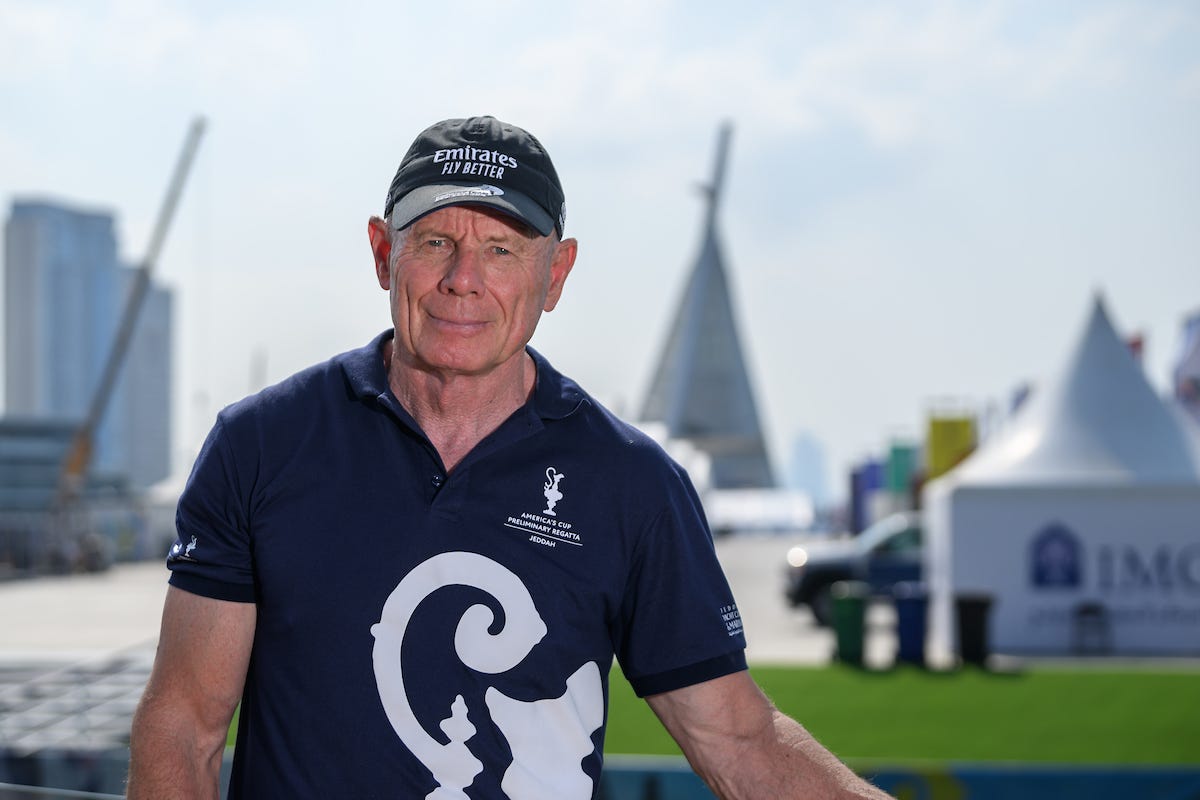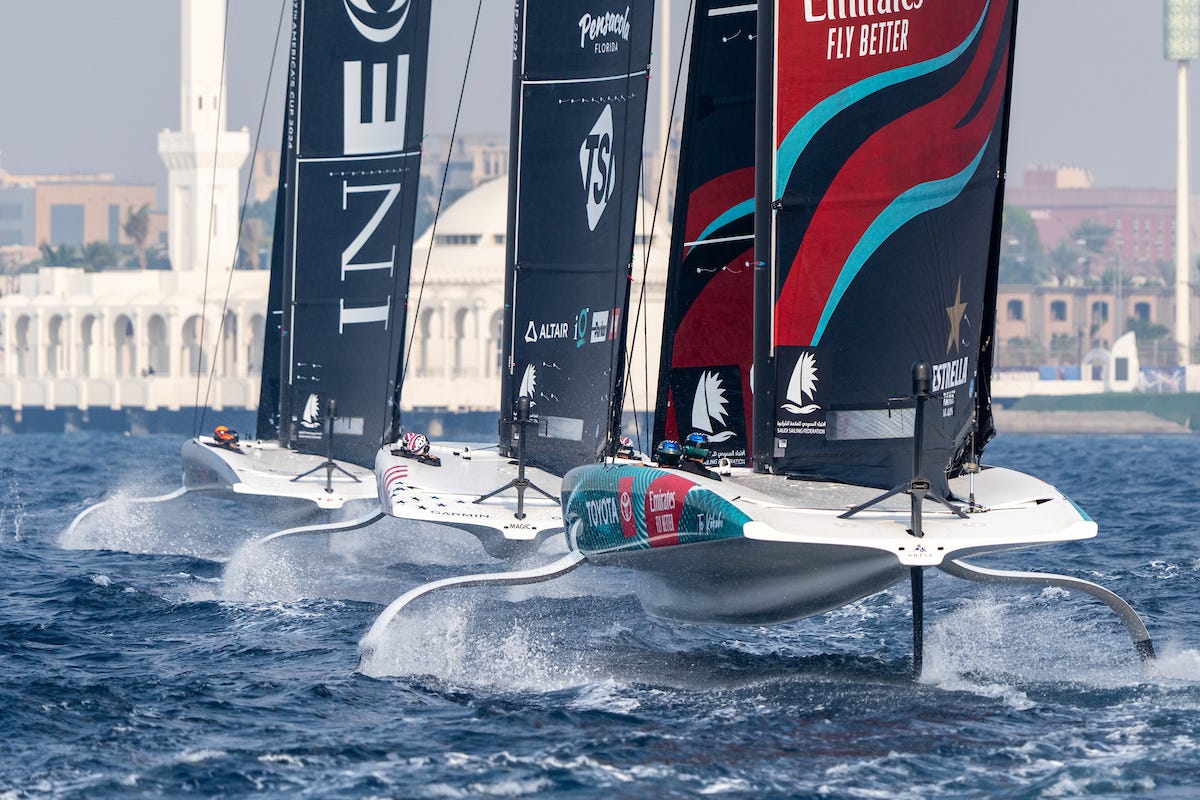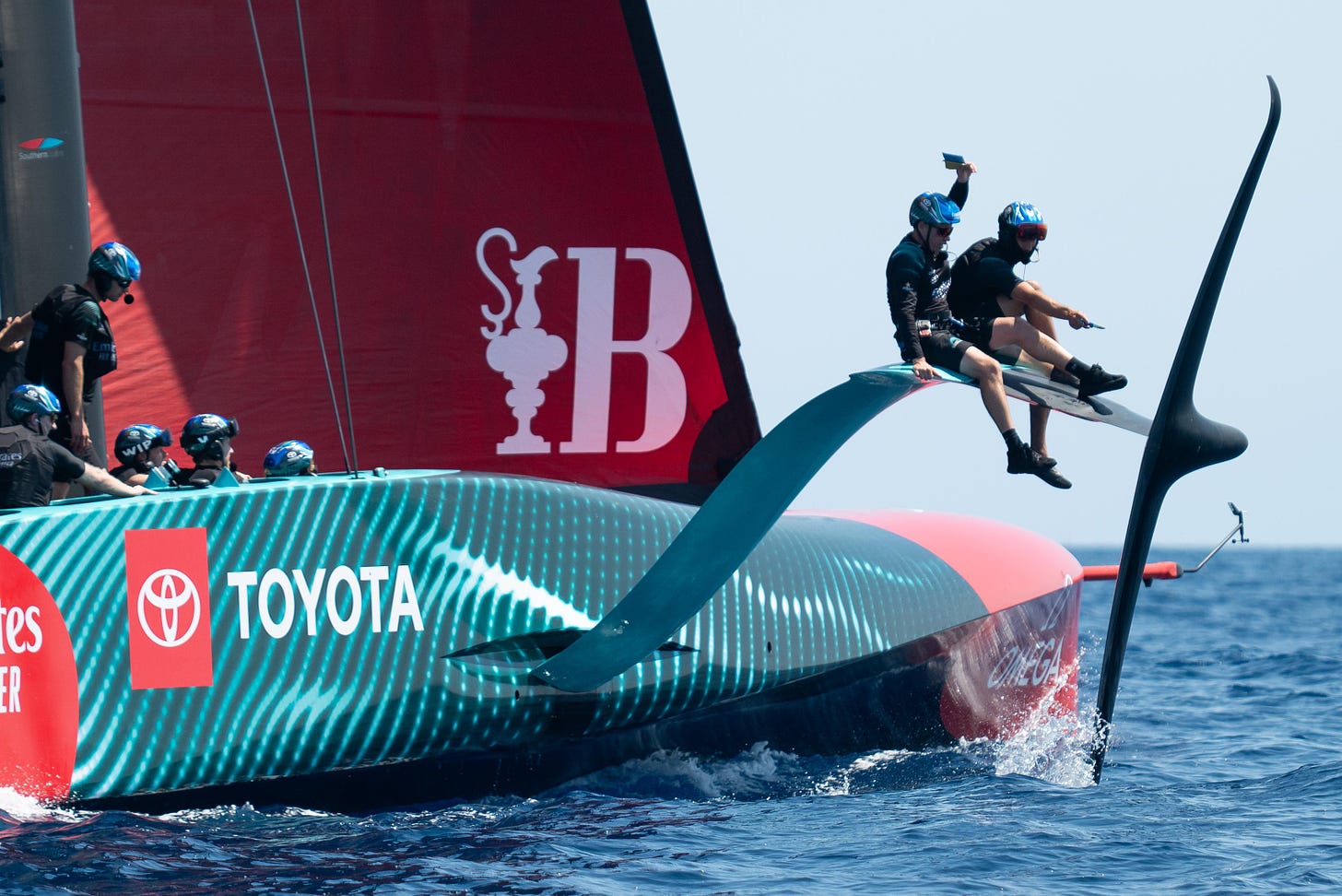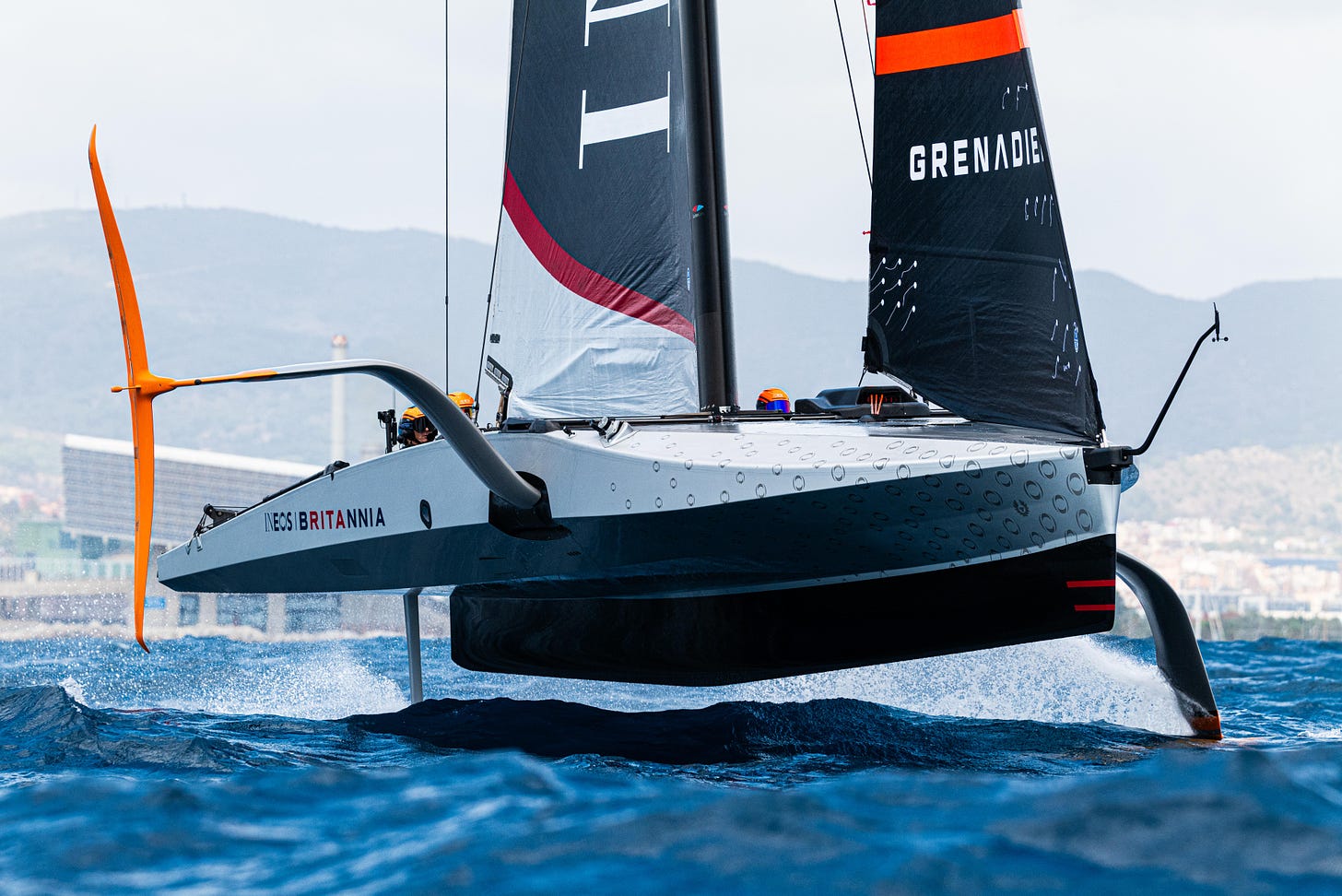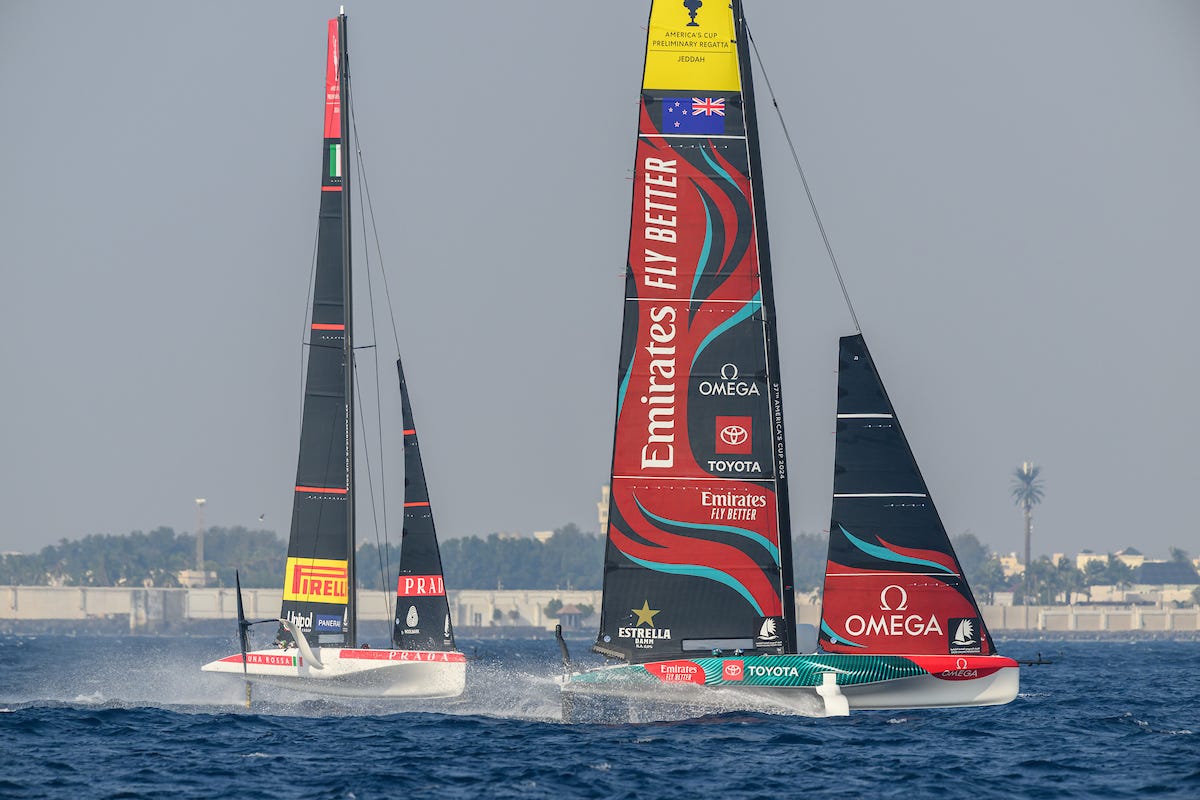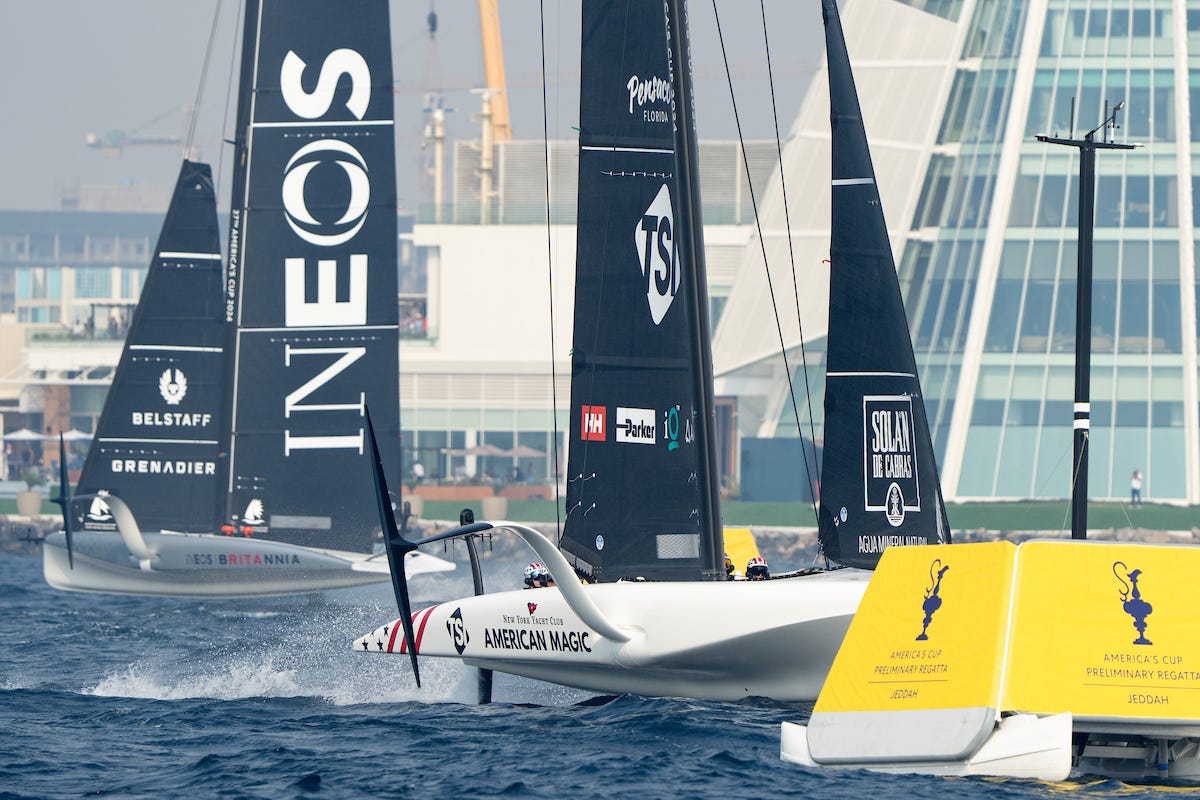15 minutes with Grant Dalton
Time was tight during the AC37 preliminary event in Jeddah so make the most of my window of opportunity I focused on three topics: the event, the team, and the AC40
During the 37th America’s Cup preliminary regatta in Jeddah I managed to grab a short interview with Emirates Team New Zealand and America’s Cup Event CEO Grant Dalton.
Our meeting took place prior to racing on the final day and Dalton’s busy schedule at the event meant that time was tight. So, to make the most of my 15-minute window of opportunity I focused on three topics: the event, the team, and the AC40.
The event
I began by asking just how satisfying for him the previous spectacular three-race day sailed in around 12 knots of breeze had been to watch – especially after the trials and tribulations of the first preliminary event in Spain three months earlier and a light wind opening day in Jeddah.
Dalton confessed to some relief that all three scheduled races had been possible on that first day.
“On the back of Villanova when the wind didn't show, on Thursday I thought: ‘Well, here we go again’ – although we got away with it in the end.
“Yesterday was what we have all been waiting for and we were able to see just how manoeuvrable and quick these boats really are,” he said. “So it was really satisfying.”

More satisfying, Dalton told me, was to be responsible for running a successful event in Jeddah where, he said, the America’s Cup is leading the charge promoting sailing to a population previously completely unfamiliar with the sport.
“It’s a sport that they have had no idea what's going on or even seen before. There wasn't a boat out here until four years ago. So it’s really satisfying that it appears – you never really know at this stage – that it's been well received in Jeddah and in the Kingdom.
“Whatever happens next, and for whoever, we are the trailblazers. That'll never change until the day I die. We will have always led the charge into Saudi Arabia.”
There has been a lot of cynicism about the America’s Cup choosing Saudi Arabia as the venue for the second preliminary regatta of the latest America’s Cup cycle – the second under Dalton’s leadership – but Dalton was unapologetic about the move and revealed that the Kingdom had been ‘close to getting the whole Cup’.
“I decided that Barcelona was the better choice, at this stage,” he said. “That's proved to be really correct as Barcelona is delivering brilliantly – because the city sees this as its biggest event since the '92 Olympics.”
Nevertheless Dalton can clearly envisage a possible return to Saudi Arabia for the America’s Cup at some point.
“Who knows what the future holds? I don't know whether it's in their mind, but in my mind that there's a future here within the sport.
Dalton told me – in no uncertain terms – that he didn’t care in the slightest about the cynics who accuse him of bringing the America’s Cup to the Middle East simply to cash in on the region’s reportedly deep pockets.
So had the event made a lot of money or had it – as another credible insider in Jeddah had earlier told me – simply ‘washed its face’?
“Let me try to give it context,” Dalton responded. “It's making money, but it is less money than Sail GP wanted to come here.”
The team
Speak to anyone from one of the five challenging teams for the 37th America’s Cup and they will tell you that the Defenders Emirates Team New Zealand always seem to be a couple of steps ahead of the chasing pack.
However, Dalton was characteristically sceptical about this suggestion.
“Maybe they think like that – or maybe they think that can destabilise us and make us soft. We certainly don't think about it that way internally. I think the way we think about it – and always have – is to think of ourselves as a Challenger, not a Defender. We live in that siege mentality.
“We've got to beat all the Challengers – which I know sounds slightly obvious because we're the Defenders, so we have to anyway – but we feel like we have to beat them all through the rounds, mentally. That forces us to always be trying to improve at every stage of this campaign.”
Despite the Kiwis successfully defending the Cup on home waters in Auckland during the 36th edition, Dalton told me he had been unhappy with the teams’ performance afterwards and had subsequently made some ‘not obvious, but very big changes’.
“I was less than happy with the way we performed in Auckland. In fact, I was damn pissed off. I think we are a much more coherent team now. In fact, I think we are a quantum step on as a team than we were in Auckland.
“Whether that translates into a fast boat going around the course, I have no idea. But internally, the team is far more coherent, far more together, far more challenging of each other, and I think a much better team.”
Watching the teams training in Barcelona over recent months I had been struck by how efficient Emirates Team New Zealand appear to be in every aspect of their operation. To me the ethos appeared to be maximum organisation, minimum unnecessary faff.
Dalton agreed with my summation and put much of this down to the team members having known each other and worked together for such a long time. He recalled being mighty impressed himself on the day the team first sailed their legacy AC75 in Barcelona.
Watching from his 23rd floor apartment that looks out onto the America’s Cup race course Dalton recalls witnessing what he describes as the team’s ‘ruthless efficiency’.
“We took the 75 out, we did what we had to do. We went in and we debriefed. It was something I hadn't really seen to that level in the buildup so far. I think that has continued on. When I look around the other teams they aren't necessarily that efficient.
“Now, again, that doesn't translate to speed on the water, but I think we are using our resources and our time well.”
I have heard several times recently rumours that the Kiwis are only really worried by one of the five Challengers – namely the Italian Luna Rossa Prada Pirelli syndicate that gave them a decent run for their money in the 36th America’s Cup Match in Auckland.
Dalton believes the Italians will be strong contenders but said it was ‘unfair’ to claim his team were focused solely on them.
“I think Luna Rossa look really strong,” he said. “They're together, they're quiet, they're organised, they've got good people. They've learned – it looks like there's a lot less interference from Bertelli this time. I am sure they are going to be strong.”
Surprisingly perhaps, given their poor AC40 results and recent damage to their silver T6 test boat, Dalton singled out the British Challenger of Record INEOS Britannia as having strong potential – particularly because of their highly technical, Mercedes F1-backed, LEQ12-based approach.
“I think the Brits will be actually really good,” he said. “I've just got this sense that there’s something about them from a design point of view. The fact that they're busting stuff just tells me that they're pushing the edge – not that they don't know what they're doing. It's the other way around: Sometimes you have to break stuff to learn.
“Who knows? In their ‘science project’ they might've thought of something that we don't even know exists, and they will be gone.”
The AC40
For me, the incredible new AC40 one design foiling monohull has been one of the highlights of this latest America’s Cup cycle and happily the racing we all watched in Jeddah has proven its potential to showcase the highest level of our sport.
The design recently won World Sailing’s Boat of the Year award for 2023. 12 boats have now been built and these will be used next year for the Youth and the Women’s America’s Cup.
New boats are available for sale to private owners, a class association has been formed, and plans to create a race circuit are reportedly well advanced.
How, then, did Dalton view the AC40’s potential future as a class?
“Well, there's definitely a will to turn it into a class,” he told me.
“Pricewise, the running costs are quite low compared to the TP52. A decent TP52 program – where you buy a boat from this year, modify it by doing this and that, and then run a full season with sails - will cost you around $6 million a year. You could run an AC40 for a third of that. You only need one to two sets of sails for the whole season, so once you've bought the boat your running costs are pretty small.
“I hope that we start selling them to private owners – guys like Ernesto Bertarelli or Chris Bake. I think they would race in them and do a bloody good job. That's where we see its future.”
What about the idea of the AC40 becoming a feeder class for the America's Cup? Dalton believes there is a potential for a hybrid model combining private owners and aspiring AC teams.
“You want a fleet - not just five boats,” he said. “The good guys, the Ernestos, want to test themselves. So they want to race against the likes of Pete [Burling] and Nathan [Outteridge]. But then they are part time and the pros are full time. So you might have a pro-am as part of it – like you do in motor racing all the time. One pro on one side, the amateur on the other.
“It hasn't been thought through yet, and it's something where we don't have a mortgage on the good ideas. If a guy like Ernesto or Chris or others want to do it then we are happy to listen to ideas for sure.”




